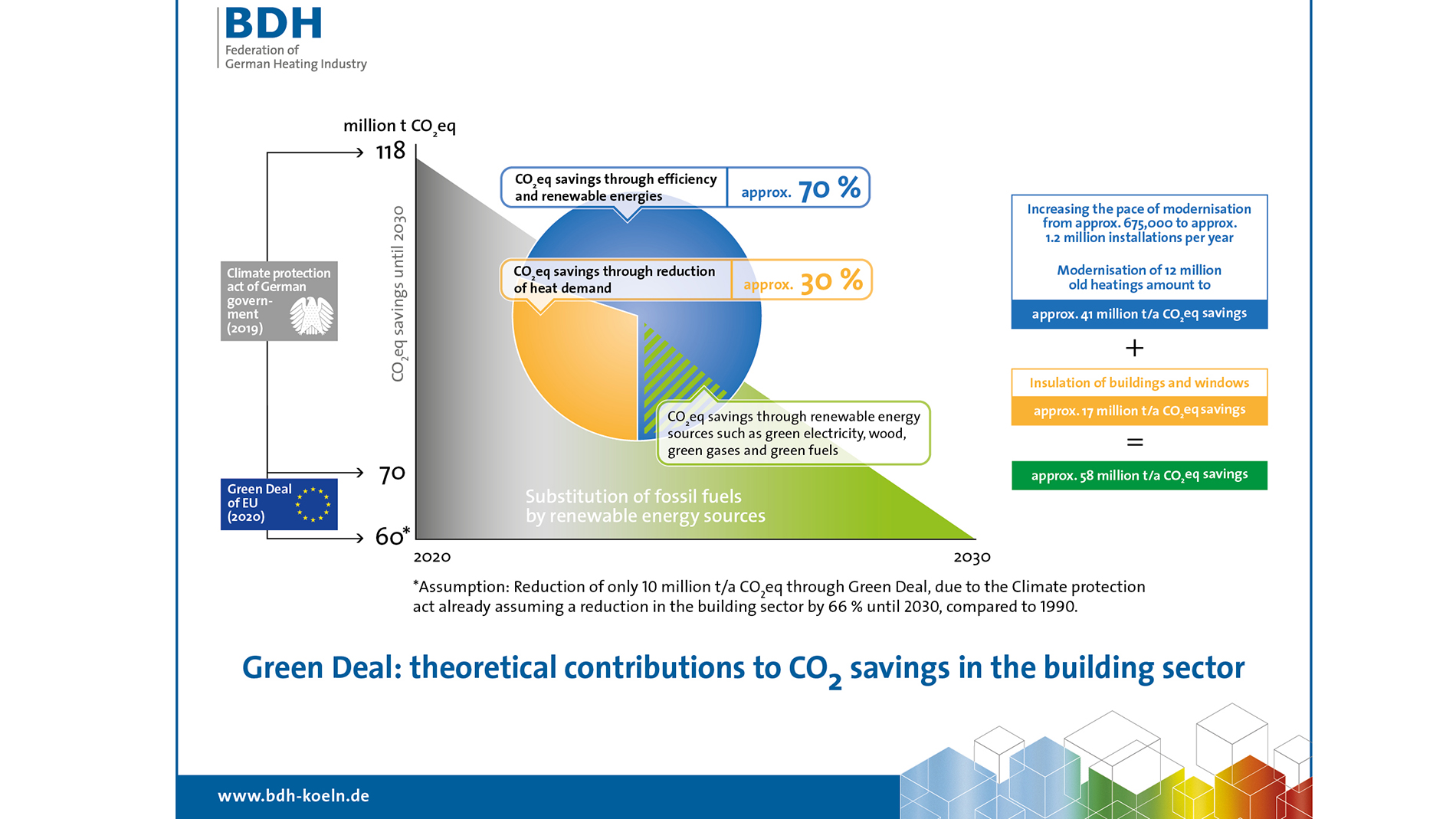To the Top Themes overview
The climate targets set by the European Union’s ‘Green Deal’ are ambitious. The EU wants, by 2030, to have reduced its greenhouse gas emissions by 55 percent compared with 1990 levels. Before the adoption of the Green Deal, the target was a 40 percent reduction. This tightening of targets also has consequences for the largest energy consumer in both Germany and Europe – the heating market.
The German Federal Government’s 2019 Climate Protection Law stipulates a reduction in CO2 emissions from 118 million tonnes to 70 million tonnes (minus 40 percent) in the German real-estate sector by 2030. In November 2020, the European Council agreed a tightening of CO2 reduction targets within the Green Deal from the original 40 percent to “at least 55 percent” by 2030.
“We welcome the fact that the EU is consistently driving forward with climate protection,” says Uwe Glock, President of the Federation of the German Heating Industry (BDH). “The heating industry is ‘Green Deal ready’ and has a significant contribution to make to the reduction of CO2 in the building and real-estate sectors.”
As it considers the ways of achieving the target, the BDH is working on the assumption that the agreement concluded as part of the Green Deal will also mean a tightening of targets in the building and real-estate sectors. It is now generally accepted that the target for reductions in this sector will be 60 million tonnes by 2030 instead of the previously assumed 70 million tonnes.
A three-pronged strategy will be needed to be able to achieve this assumed target for the Green Deal in the building and real-estate sector:
- A doubling in the rate at which outdated heating installations are replaced. This will affect around 12 million existing heating systems that will need to be swapped for hybrid renewable technologies, combining both high efficiency and renewable energies. This involves, as an intrinsically important component of the investment, the optimisation of downstream fluid-based heat distribution systems, in addition to a doubling of the number of replacements from today’s approximate figure of around 3 percent to 6 percent.
- Increased electrification of the heating market. As the electricity sector already includes the highest proportion of renewable energies, combinations involving electrically powered heat pumps offer multiple opportunities to use renewable energies and, moreover, reduce the overall end consumption of energy
- An immediate start to the process of shifting the energy mix in the heating market and the accelerated roll-out of low-CO2 and CO2-free energy sources
- Green Gases including biomethane and hydrogen
- Green Fuels including biogenic and synthetic constituents, such as ‘power-to- liquid’ products
- Increase in green components in the electricity supply, coupled with increased use of heat pumps
- Energy / heat from wood
Moreover, in the planned roll-out of a green and, in the short term, blue hydrogen economy, we must avoid any centrally controlled allocation of the initially limited resources of CO2-free hydrogen. This inevitably means including the heating market in the hydrogen strategy from the outset, not least in view of the huge R&D expenditure now required of the heating industry to create ‘H2-ready’ heating technologies, including the use of fuel-cells.

Source: BDH Federation of German Heating Industry
Attractive complementary programme with the Technology and Energy Forum
In the complementary programme at ISH digital 2021, the BDH, together with its 14 partner associations and under the aegis of the German Federal Ministry for Economic Affairs and Energy (BMWi), will again be organising the Technology and Energy Forum. Here the focus is on the current political framework conditions in the heating market and the ways in which the ambitious climate targets can be achieved in the building and real-estate sector. Under the heading ‘Green Deal ready’, participants will be able to learn all about the current state of play in modern heating technology. In addition, the future of the different sources of energy on the heating market will have a major part to play on the journey to climate neutrality. The multimedia special show will be accompanied by live events with distinguished representatives from the worlds of politics and industry as well as from the professional associations, together with extensive background information on the partner associations.
Federation of the German Heating Industry (BDH)